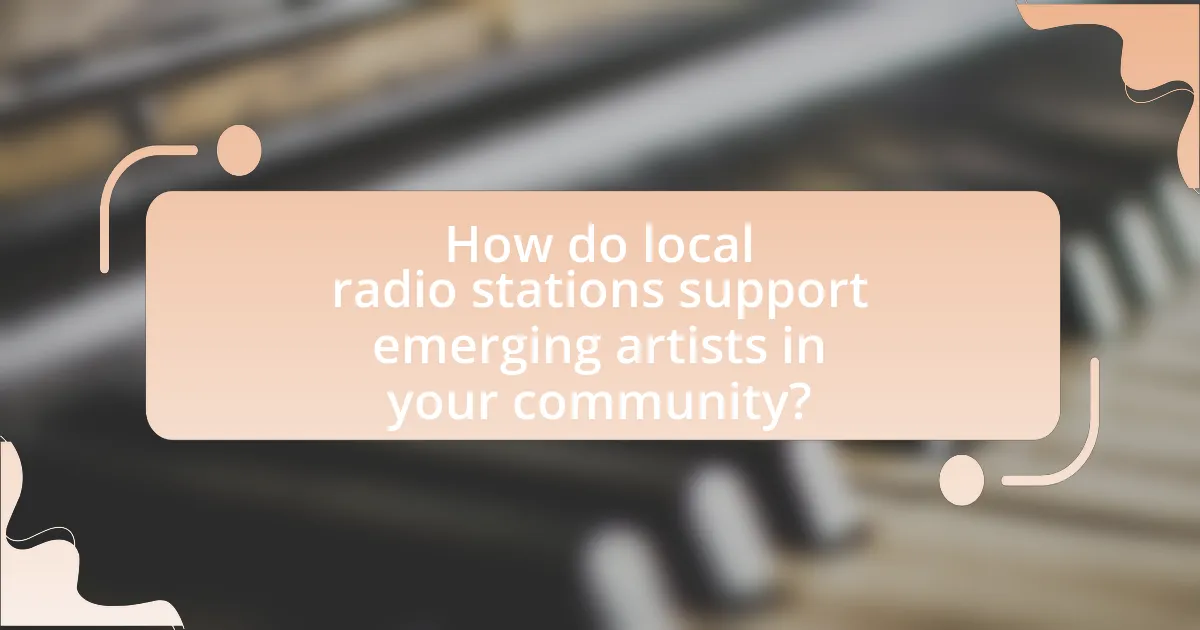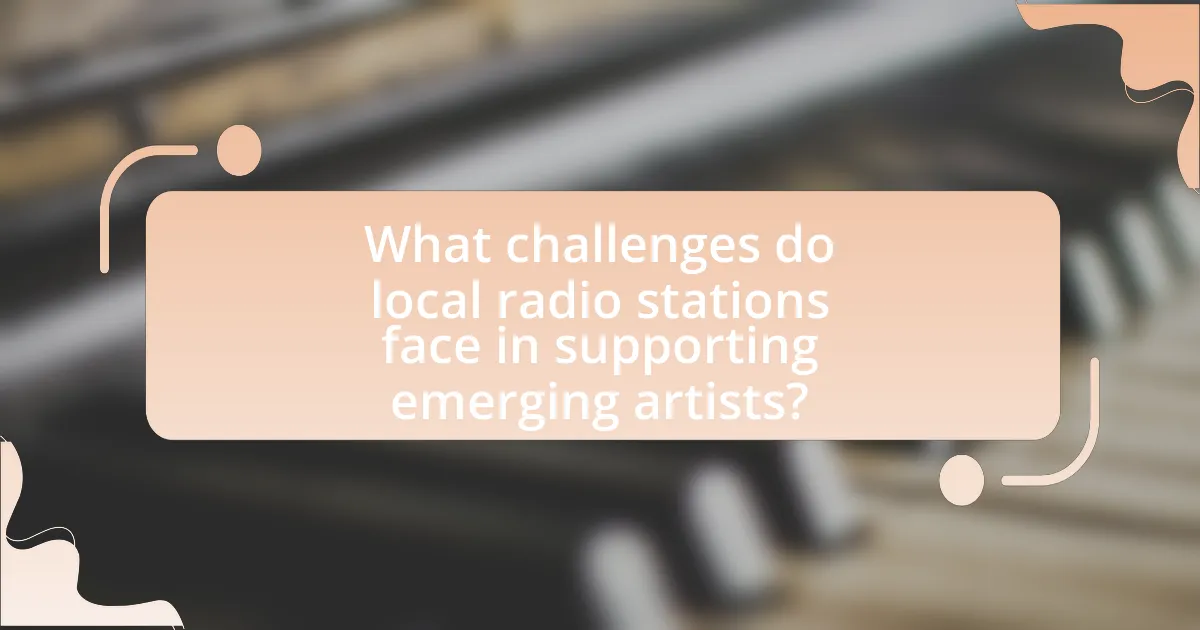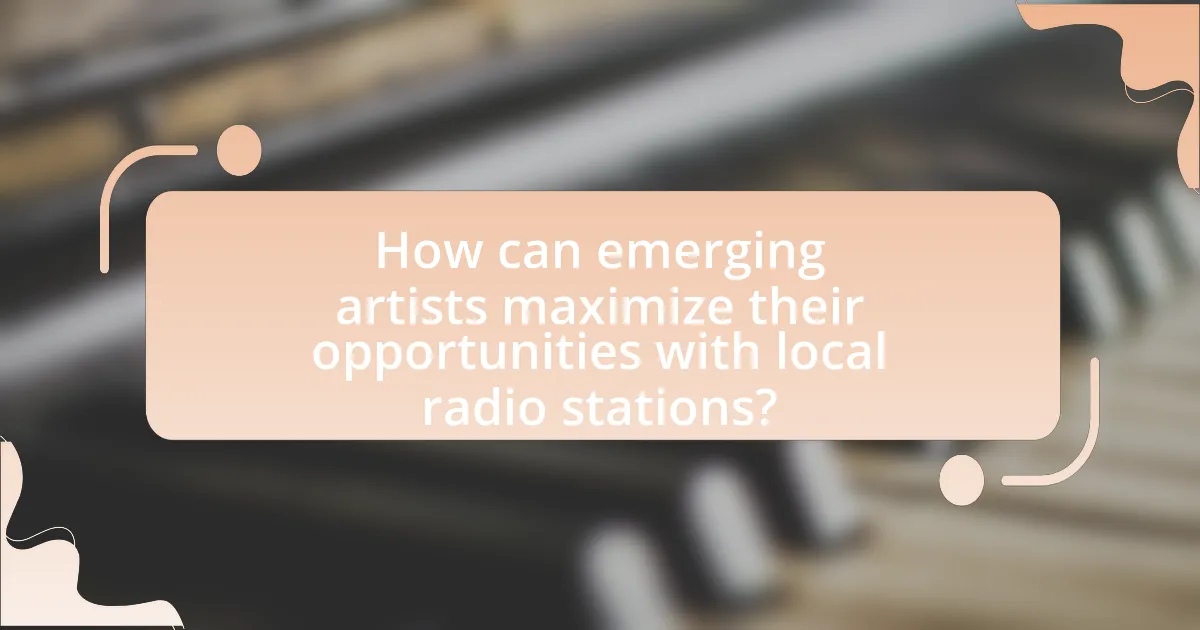Local radio stations play a vital role in supporting emerging artists within their communities by providing airplay, hosting live events, and fostering connections between artists and audiences. They offer platforms for exposure through dedicated segments, interviews, and performances, which enhance visibility and credibility for new talent. Despite facing challenges such as limited resources and competition from digital platforms, local radio remains a significant avenue for music discovery, helping artists build fan bases and navigate their careers. The article explores the various ways local radio stations promote new talent, the benefits of radio airplay, and strategies for artists to maximize their opportunities within this ecosystem.

How do local radio stations support emerging artists in your community?
Local radio stations support emerging artists in the community by providing airplay for their music, which increases visibility and audience reach. For instance, many stations have dedicated segments or shows that feature local talent, allowing artists to showcase their work to a broader audience. Additionally, local radio often hosts events, such as open mic nights or music festivals, where emerging artists can perform live, further promoting their music and connecting them with fans. This support is crucial, as studies show that radio exposure can significantly impact an artist’s career trajectory, leading to increased streaming and sales.
What roles do local radio stations play in promoting new talent?
Local radio stations play a crucial role in promoting new talent by providing a platform for emerging artists to showcase their music. They often feature local musicians in their playlists, conduct interviews, and host live performances, which increases visibility and audience reach. For example, many local stations have dedicated segments for unsigned artists, allowing them to gain exposure that might be difficult to achieve through larger media outlets. This support not only helps artists build a fan base but also fosters a sense of community by connecting listeners with local culture and talent.
How do radio airplay opportunities benefit emerging artists?
Radio airplay opportunities significantly benefit emerging artists by providing them with exposure to a wider audience. This exposure can lead to increased fan engagement, as listeners discover new music through radio playlists. According to a study by the Nielsen Music, radio remains a primary source for music discovery, with 40% of listeners stating they find new artists through radio. Additionally, airplay can enhance an artist’s credibility and legitimacy in the industry, as being featured on radio stations often signals quality and professionalism. This credibility can open doors for further opportunities, such as live performances and collaborations, ultimately aiding in the artist’s career growth.
What platforms do local radio stations provide for artist exposure?
Local radio stations provide platforms such as on-air play, interviews, and live performances for artist exposure. These platforms allow emerging artists to reach local audiences, build a fan base, and gain credibility within the music industry. For instance, many local stations host dedicated music shows that feature new artists, often highlighting local talent and providing a space for them to share their stories and music. Additionally, radio stations may organize events or contests that promote local artists, further enhancing their visibility and engagement with the community.
Why is community engagement important for local radio stations?
Community engagement is crucial for local radio stations because it fosters a strong connection between the station and its audience, enhancing listener loyalty and participation. Engaged communities are more likely to support local initiatives, including emerging artists, as they feel a sense of ownership and pride in their local culture. Research indicates that local radio stations that actively involve their communities in programming and events see increased listenership and community support, which can lead to higher advertising revenue and sustainability. For instance, a study by the National Federation of Community Broadcasters found that stations with robust community engagement strategies reported a 30% increase in listener interaction and a significant boost in local sponsorships.
How do local events and collaborations enhance artist visibility?
Local events and collaborations enhance artist visibility by providing platforms for exposure and networking opportunities. These events allow artists to showcase their work to a broader audience, often leading to increased recognition within the community. For instance, participation in local festivals or art shows can attract media attention, which further amplifies an artist’s reach. Collaborations with other artists or local businesses can also create cross-promotional opportunities, expanding the artist’s audience base. According to a study by the National Endowment for the Arts, community engagement through local events significantly boosts artists’ profiles and can lead to increased sales and opportunities for future projects.
What impact does listener feedback have on emerging artists?
Listener feedback significantly influences emerging artists by providing them with insights into audience preferences and areas for improvement. This feedback helps artists refine their music, enhance their performances, and build a loyal fan base. For instance, studies show that artists who actively engage with listener feedback often experience increased streaming numbers and social media engagement, leading to greater visibility and opportunities in the music industry. Additionally, local radio stations that facilitate listener feedback create a supportive environment, allowing artists to gauge their impact and adapt their work accordingly, which is crucial for their growth and success.
How do local radio stations foster relationships with artists?
Local radio stations foster relationships with artists by providing platforms for exposure and collaboration. They often feature local musicians in on-air interviews, live performances, and dedicated segments that highlight new music, which helps artists reach wider audiences. Additionally, radio stations may organize events such as concerts or showcases that allow artists to perform live, further strengthening community ties. Research indicates that local radio plays a crucial role in promoting regional talent, as evidenced by a study from the University of Southern California, which found that 70% of local artists reported increased visibility and opportunities after being featured on local radio.
What mentorship programs are available through local radio stations?
Local radio stations often offer mentorship programs aimed at supporting emerging artists in their communities. These programs typically include workshops, one-on-one coaching sessions, and opportunities for artists to gain hands-on experience in broadcasting and music production. For instance, programs like “Radio Ready” and “Emerging Artist Showcase” provide platforms for artists to receive guidance from industry professionals and feedback on their work. Additionally, many local stations collaborate with community organizations to host events that connect artists with mentors who have experience in the music industry, enhancing their skills and visibility.
How do radio interviews and features help artists connect with audiences?
Radio interviews and features help artists connect with audiences by providing a platform for direct communication and storytelling. Through these interviews, artists can share their personal experiences, motivations, and the stories behind their music, which fosters a deeper emotional connection with listeners. Research indicates that 70% of listeners feel more connected to artists when they hear them speak about their work, as it humanizes the artist and makes their music more relatable. Additionally, local radio stations often have a loyal audience base, allowing artists to reach potential fans in their community, thereby enhancing their visibility and engagement.

What challenges do local radio stations face in supporting emerging artists?
Local radio stations face significant challenges in supporting emerging artists, primarily due to limited budgets and resources. These financial constraints restrict their ability to promote new talent effectively, as they often prioritize established artists who can attract larger audiences and advertising revenue. Additionally, local radio stations may lack the necessary infrastructure and connections to provide emerging artists with the exposure they need, such as access to industry events or collaborations with more prominent musicians. Furthermore, competition from digital platforms, which offer broader reach and lower barriers for artists, makes it difficult for local stations to maintain relevance in the music promotion landscape.
How do funding and resource limitations affect local radio stations?
Funding and resource limitations significantly hinder local radio stations by restricting their ability to operate effectively and support community initiatives. These constraints often lead to reduced programming quality, limited staff, and fewer resources for promoting local artists. For instance, a study by the National Federation of Community Broadcasters found that over 60% of community radio stations reported financial challenges that impacted their programming and outreach efforts. Consequently, local radio stations struggle to provide platforms for emerging artists, limiting their exposure and opportunities for growth within the community.
What strategies can local radio stations use to overcome financial challenges?
Local radio stations can overcome financial challenges by diversifying revenue streams, enhancing community engagement, and leveraging digital platforms. Diversification can include offering advertising packages, hosting events, and creating sponsorship opportunities, which can increase income sources beyond traditional advertising. Enhanced community engagement through local partnerships and collaborations can foster listener loyalty and attract more advertisers. Additionally, utilizing digital platforms for streaming and podcasting can expand audience reach and create new monetization avenues, as evidenced by the growth of podcasting, which generated over $1 billion in revenue in 2021. These strategies collectively enable local radio stations to adapt to changing market conditions and sustain their operations.
How does competition with digital platforms impact local radio’s support for artists?
Competition with digital platforms significantly reduces local radio’s support for artists. As streaming services and social media dominate music consumption, local radio stations face declining listenership and advertising revenue, which limits their ability to promote emerging artists. For instance, a 2021 report by the Pew Research Center indicated that 50% of adults aged 18-29 prefer streaming services over traditional radio, leading to a shift in how music is discovered and consumed. Consequently, local radio stations often prioritize established artists with proven commercial success to attract listeners, thereby diminishing opportunities for new and local talent.
What barriers do emerging artists encounter when seeking radio support?
Emerging artists encounter several barriers when seeking radio support, primarily including limited access to industry connections, lack of promotional resources, and competition from established artists. Limited access to industry connections hinders emerging artists from networking with radio personnel who can influence airplay decisions. Additionally, many emerging artists lack the financial resources necessary for effective promotion, which is crucial for gaining visibility in a crowded market. Competition from established artists further complicates their efforts, as radio stations often prioritize well-known acts over newcomers, making it challenging for emerging talent to secure airtime.
How can artists effectively pitch their music to local radio stations?
Artists can effectively pitch their music to local radio stations by crafting a concise, engaging press release that highlights their unique sound and local ties. This approach is essential because radio stations often prioritize content that resonates with their community and audience. Including a brief biography, links to high-quality recordings, and information about upcoming performances can further enhance the pitch. Additionally, personalizing the communication by addressing specific station programs or DJs can increase the likelihood of a positive response, as stations appreciate tailored pitches that demonstrate an understanding of their format and audience preferences.
What misconceptions do artists have about local radio station support?
Artists often mistakenly believe that local radio stations primarily focus on mainstream music and do not support emerging artists. This misconception overlooks the fact that many local radio stations actively seek to promote local talent by dedicating airtime to independent and lesser-known musicians. For instance, according to a study by the National Association of Broadcasters, over 70% of local radio stations feature local artists in their programming, showcasing their commitment to community engagement and support. This demonstrates that local radio can be a vital platform for emerging artists to gain exposure and connect with their audience.

How can emerging artists maximize their opportunities with local radio stations?
Emerging artists can maximize their opportunities with local radio stations by actively engaging with station personnel and participating in community events. Building relationships with DJs and program directors can lead to airplay and promotional support. For instance, artists can offer exclusive interviews, live performances, or participate in local music showcases organized by the station, which can increase their visibility. According to a study by the National Association of Broadcasters, local radio stations significantly contribute to the discovery of new music, with 70% of listeners stating they find new artists through radio. This demonstrates the potential impact of local radio on an artist’s career.
What best practices should artists follow when engaging with local radio?
Artists should prioritize building relationships with local radio stations by actively engaging with their staff and understanding the station’s audience. Establishing a personal connection can lead to more opportunities for airplay and promotion. Additionally, artists should prepare a professional press kit that includes their music, a bio, and contact information, making it easy for radio hosts to feature them.
Furthermore, artists should be proactive in reaching out to local radio shows that align with their genre, as targeted pitches increase the likelihood of being featured. Engaging with the station’s social media and participating in community events can also enhance visibility and foster goodwill.
Research indicates that local radio plays a crucial role in promoting emerging artists, with studies showing that artists featured on local stations often experience increased local recognition and attendance at their shows.
How can artists build relationships with radio DJs and hosts?
Artists can build relationships with radio DJs and hosts by actively engaging with them through social media, attending local events, and offering exclusive content. Engaging on social media platforms allows artists to connect directly with DJs, share their music, and participate in conversations, which can lead to increased visibility. Attending local events where DJs are present provides opportunities for face-to-face interactions, fostering personal connections. Additionally, offering exclusive content, such as interviews or live performances, can incentivize DJs to feature the artist’s work on their shows. These strategies are effective because they create a mutual interest and establish a rapport that can lead to ongoing support from radio hosts.
What promotional materials should artists prepare for radio submissions?
Artists should prepare a press kit for radio submissions, which typically includes a professional biography, high-quality promotional photos, a one-sheet with key information about the artist and their music, and links to their music or a digital download. A well-crafted press kit helps radio stations quickly understand the artist’s brand and music style, facilitating better promotion. According to the Music Industry Association, a comprehensive press kit increases the chances of airplay by providing essential information in an organized manner, making it easier for radio personnel to assess the artist’s potential fit for their programming.
What resources are available for artists looking to connect with local radio?
Artists looking to connect with local radio can utilize several resources, including local radio station websites, social media platforms, and community events. Local radio stations often have dedicated sections on their websites for artist submissions, playlists, and contact information, making it easier for artists to reach out. Additionally, social media platforms like Facebook and Instagram allow artists to engage with radio stations directly, often through comments or direct messages. Community events, such as open mic nights or music festivals, frequently feature local radio stations, providing artists with opportunities to network and promote their music. These resources facilitate connections between artists and local radio, enhancing visibility and support for emerging talent.
How can social media be leveraged to enhance radio engagement?
Social media can enhance radio engagement by providing platforms for real-time interaction between listeners and radio stations. This interaction allows listeners to participate in discussions, request songs, and provide feedback, which fosters a sense of community and loyalty. For instance, a study by the Pew Research Center found that 72% of adults use social media, making it an effective tool for radio stations to reach a broader audience and engage with them directly. Additionally, radio stations can use social media to promote upcoming shows, share exclusive content, and highlight emerging artists, thereby increasing visibility and listener involvement.
What local organizations can assist artists in navigating radio opportunities?
Local organizations that assist artists in navigating radio opportunities include community arts councils, local music associations, and nonprofit organizations focused on arts advocacy. These organizations often provide resources such as workshops, networking events, and mentorship programs specifically designed to help artists understand the radio landscape and connect with local stations. For example, the National Association of Broadcasters offers resources that can guide artists in promoting their work through radio, while local music associations frequently host events that facilitate direct interactions between artists and radio professionals.
What tips can help artists effectively utilize local radio for their careers?
Artists can effectively utilize local radio for their careers by actively engaging with station personnel, submitting high-quality recordings, and participating in community events. Building relationships with DJs and program directors can lead to airplay opportunities and interviews, which enhance visibility. High-quality recordings increase the likelihood of being featured, as local stations often seek professional-sounding content. Additionally, participating in community events hosted by local radio can provide networking opportunities and direct exposure to potential fans. According to a study by the National Association of Broadcasters, local radio remains a primary source for music discovery, making it a valuable platform for emerging artists.